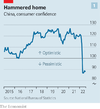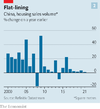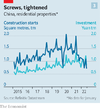Garpal Gumnut
Ross Island Hotel
- Joined
- 2 January 2006
- Posts
- 13,344
- Reactions
- 9,449
Many commentators seem to view China as a homogenous hegemony when in fact it is subject to the same civil disruptions as all powerful empires and civilisations in the past.
It's peoples seem to be displaying "Melbourne-type" reactions to the anti-Covid measures in place atm. within it's borders. All empires have their day, particularly those with overly unctuous internal controls dripping from the top, much as the former USSR had, and the present Russia barely holds, over their far flung provinces.
A period of civil disorder may have two effects, one to hasten external conflict against Taiwan or secondly the top Chinese oligarchs of the CPC trying to continue the internal control of the CPC on the minions.
It is thus extremely difficult to assess the effects commercially for Australia and in particular the products of our quarry on which the XAO depends. It looks as if cattle and grain are in line for Chinese sanctions even without internal civil disturbance. The Chinese efforts seem to me to be over the top attempts to contain a coronavirus. Rather like trying to overtake a single axle Victorian plated caravan on a one bitumen lane bush track without damaging the paint on the Arnage or watching the visitors end a**e up in the scrub.
I do hope our major ASX listed companies have a plan B for when China either becomes more externally aggressive or descends in to internal disorder. It is very difficult to stop a billion people from catching a cold. I doubt if they will succeed. The constituent companies of the XAO need to be prepared.
gg
It's peoples seem to be displaying "Melbourne-type" reactions to the anti-Covid measures in place atm. within it's borders. All empires have their day, particularly those with overly unctuous internal controls dripping from the top, much as the former USSR had, and the present Russia barely holds, over their far flung provinces.
A period of civil disorder may have two effects, one to hasten external conflict against Taiwan or secondly the top Chinese oligarchs of the CPC trying to continue the internal control of the CPC on the minions.
It is thus extremely difficult to assess the effects commercially for Australia and in particular the products of our quarry on which the XAO depends. It looks as if cattle and grain are in line for Chinese sanctions even without internal civil disturbance. The Chinese efforts seem to me to be over the top attempts to contain a coronavirus. Rather like trying to overtake a single axle Victorian plated caravan on a one bitumen lane bush track without damaging the paint on the Arnage or watching the visitors end a**e up in the scrub.
I do hope our major ASX listed companies have a plan B for when China either becomes more externally aggressive or descends in to internal disorder. It is very difficult to stop a billion people from catching a cold. I doubt if they will succeed. The constituent companies of the XAO need to be prepared.
gg








